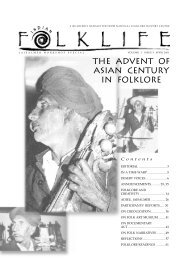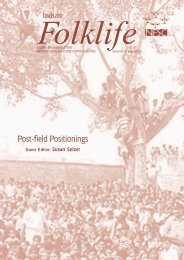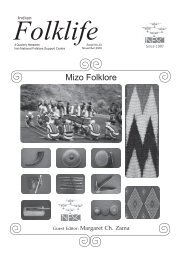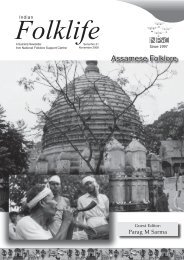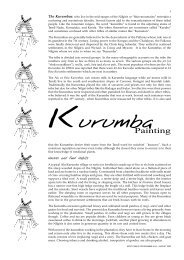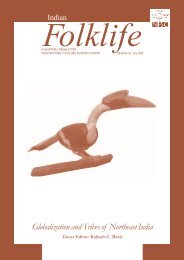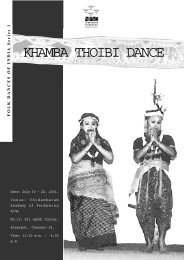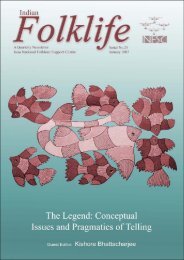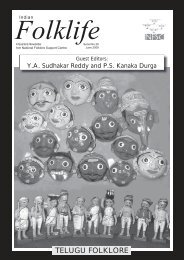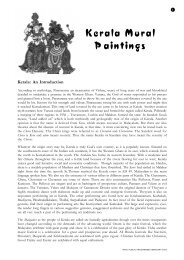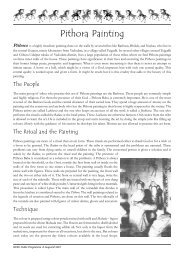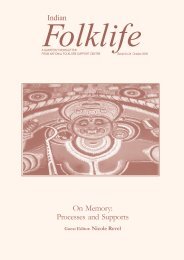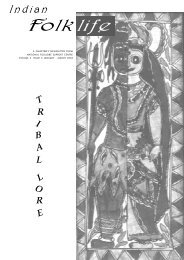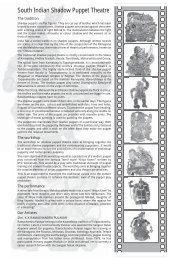Tripura Folklore - Wiki - National Folklore Support Centre
Tripura Folklore - Wiki - National Folklore Support Centre
Tripura Folklore - Wiki - National Folklore Support Centre
Create successful ePaper yourself
Turn your PDF publications into a flip-book with our unique Google optimized e-Paper software.
8<br />
construction of shelter, it provided containers<br />
for liquids, it could be used both as a faggot<br />
and as a cooking utensil. For Jum cultivation,<br />
bamboo groves had to be burnt. It further<br />
necessitated the propitiation of the bamboo<br />
spirit. Thus, the symbol of bamboo comes from<br />
its association since the beginning of clan-life.<br />
It is a purely indigenous concept.<br />
Risa (Ria:home-woven breast-cloth) is hung<br />
from the bamboo symbol. In all agricultural<br />
societies increase in harvest is the dominating<br />
desire. The fertility cult originated from this<br />
desire. In agricultural activities the role of<br />
the female acquired importance. The belief<br />
equating female with soil was formed. This<br />
belief supported the basic dictum of ancient<br />
life: ‘Live and procreate.’ Garia worship,<br />
which became primarily a ritual for plentiful<br />
harvest, also assumed the significance of the<br />
reproduction cult. The Risa and the festive<br />
abandon subsequent to the actual ‘Puja’ of<br />
Garia suggest that. More harvest and more<br />
members in the community were the two<br />
important elements for clan security. Garia,<br />
from the guardian God of plentiful harvest,<br />
also became the benefactor and guardian of<br />
the clan in all respects. This aspect of Garia<br />
festival is marked by its festive character.<br />
Dance was added, and accompanying songs<br />
were composed. There are expressly erotic<br />
expressions in Garia songs. It is<br />
said that, being instructed in a<br />
dream, King Dhanyamanikya of<br />
<strong>Tripura</strong> reclaimed God Garia from<br />
Kuki Kingdom. The victorious<br />
army brought a number of beautiful<br />
Kuki women as captives. The erotic<br />
element in the songs was a result<br />
of that. Whatever be the reason, a<br />
suggestion of the reproduction cult cannot be<br />
denied. In the festival part, there is the custom<br />
of drinking galore. Wine was recognised as<br />
a potent aphrodisiac in ancient societies. A<br />
Santhal myth states that Maran Buru (the<br />
Creator) had created man and woman, but<br />
they knew no urge for procreation. So,<br />
Maran Buru taught them how to make wine.<br />
After drinking wine, they felt the urge for<br />
procreation. With regard to the role of dancing<br />
in the festival, Frazer says that community<br />
people thought singing and dancing had<br />
magical powers and could hence translate into<br />
more production. Even the movements in the<br />
dances closely resemble the world around,<br />
and gets inspiration from everyday activities.<br />
This leads to the idea that the Garia festival<br />
originated from the soil, mirroring the history<br />
of the formation of society. Traces of ancient<br />
animism, fertility cult and reproduction cults<br />
are not matters that could have been brought<br />
in from outside. ❆<br />
I NDIAN FOLKLORE RESEARCH JOURNAL<br />
ARTICLES<br />
Number 9<br />
Global Events and Local Narratives: 9/11 and the Picture<br />
Storytellers of Bengal — ROMA CHATTERJI<br />
Translating the Oral: Translatability and Cultural<br />
Dynamics — KAILASH C. BARAL<br />
Influence of the Evil Figure, Tisso Jonding on the<br />
Socio-religio-cultural Life of Karbis — ROBINDRA TERON<br />
Acoustic Entanglements: Negotiating Folk Music in<br />
Naiy@&Ýi mÿúam Performance<br />
— AARON PAIGE<br />
Book Review<br />
Catalogue of Portuguese Folktales<br />
Edited by Isabel Cardigos<br />
— HEDA JASON<br />
NEW RELEASE<br />
INDIAN FOLKLIFE SERIAL NO.35 JANUARY 2010



